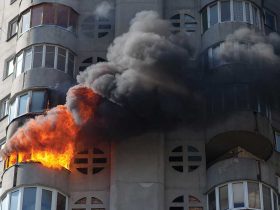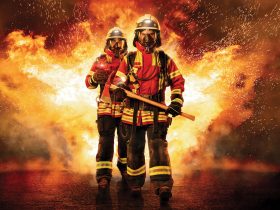It had happened a couple of times before — thatunmistakablesound of the fire alarm in my hotel room in the middle of the night. Once before it had been a false alarm, another time someone had left food on the stovetop too long.
This time was different — it was 4 a.m. As soon as I opened my door, someone said, “There’s alotof smoke down on the first floor coming out of the laundry room!” I quickly grabbed my wallet and cell phone and went down the stairs with everyone else. But I needed to see what was happening, so I turned back towards the laundry room to take a quick look, since the hall was still mostly clear of smoke. I walked by the laundry room and saw smoke rolling out of the bottom of a snack / beverage refrigeration unit. I went right outside and waited with everyone else; the fire trucks were already pulling in.
Some people looked half asleep; but l get up early every day, so I was already thinking about the inspection I was going to do over at the mall. The firefighters worked fast, putting out the small fire in the machine and evacuating the smoke. They dragged the snack unit out to the curb and in a few minutes they were gone.
As we were waiting to go back in, I started thinking about how this could have played out much differently.
- Imagine if the smoke detectors hadn’t gone off, or
- if the fire department wasn’t immediately notified.
It could have been much worse.
- Imagine if the snack machine hadn’t been Listed, or
- if the walls of the laundry room were constructed of more flammable material.
I started thinking about everyone who was involved in the actual outcome: The engineers who designed the hotel, the electrical and building contractors who built it to code; the plans reviewers, the testing laboratory that certified the snack machine; the fire marshal, electrical and building inspectors who were the last ones to sign off on the facility.

The Snack Machine… After
Sure, the snack machine was the culprit, for whatever reason — damaged cord, not well-maintained (or incorrectly maintained / repaired), there could have been a buildup of dust in the back. There could have been a mistake at the factory, a production line test missed and not caught by the laboratory factory inspector. But compared to non-certified equipment, this unit still represents a much higher level of safety, and if not certified could have instantly burst into flames or exploded, instead of just shorting out and tripping the protective device. The bottom line: There were no injuries or loss of life. At worst, it was an inconvenience for the guests.
I looked around again, and realized that probably none of the other people were thinking about all these things. They would go home talking about the very visible and heroic firefighters.
And that’s our challenge as an industry – electricity is invisible and deadly, but the general public never thinks about it too much, usually only noticing if the light switch doesn’t turn on, or if the house loses power. Unless we can find a way to be more visible, unless we can discover new ways to tell our stories and explain the importance of the public safety service we provide, we might continue to be largely ignored. If we can tell our stories to the public, maybe this will help free up the resources we need and improve our ability to keep people from being electrocuted, to keep homes and businesses from burning. Maybe this would help us win fights with politicians and special interests that are usually driven by the quest for power, prestige, greed, or other questionable motives. We need more visibility — our very survival depends on it.
Any ideas will be greatly appreciated. Please comment on this and we can work on building our public reputation.
Read more by Greg Smith










Find Us on Socials